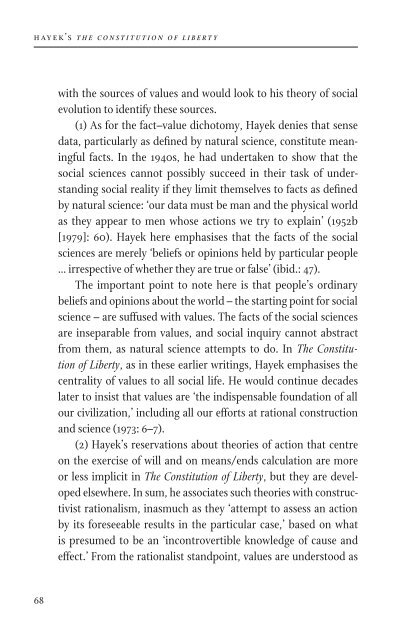Hayek's The Constitution of Liberty - Institute of Economic Affairs
Hayek's The Constitution of Liberty - Institute of Economic Affairs
Hayek's The Constitution of Liberty - Institute of Economic Affairs
Create successful ePaper yourself
Turn your PDF publications into a flip-book with our unique Google optimized e-Paper software.
h ay e k ’ s t h e c o n s t i t u t i o n o f l i b e r t y<br />
t h e u s e a n d l i m i t s o f k n o w l e d g e<br />
with the sources <strong>of</strong> values and would look to his theory <strong>of</strong> social<br />
evolution to identify these sources.<br />
(1) As for the fact–value dichotomy, Hayek denies that sense<br />
data, particularly as defined by natural science, constitute meaningful<br />
facts. In the 1940s, he had undertaken to show that the<br />
social sciences cannot possibly succeed in their task <strong>of</strong> understanding<br />
social reality if they limit themselves to facts as defined<br />
by natural science: ‘our data must be man and the physical world<br />
as they appear to men whose actions we try to explain’ (1952b<br />
[1979]: 60). Hayek here emphasises that the facts <strong>of</strong> the social<br />
sciences are merely ‘beliefs or opinions held by particular people<br />
… irrespective <strong>of</strong> whether they are true or false’ (ibid.: 47).<br />
<strong>The</strong> important point to note here is that people’s ordinary<br />
beliefs and opinions about the world – the starting point for social<br />
science – are suffused with values. <strong>The</strong> facts <strong>of</strong> the social sciences<br />
are inseparable from values, and social inquiry cannot abstract<br />
from them, as natural science attempts to do. In <strong>The</strong> <strong>Constitution</strong><br />
<strong>of</strong> <strong>Liberty</strong>, as in these earlier writings, Hayek emphasises the<br />
centrality <strong>of</strong> values to all social life. He would continue decades<br />
later to insist that values are ‘the indispensable foundation <strong>of</strong> all<br />
our civilization,’ including all our efforts at rational construction<br />
and science (1973: 6–7).<br />
(2) Hayek’s reservations about theories <strong>of</strong> action that centre<br />
on the exercise <strong>of</strong> will and on means/ends calculation are more<br />
or less implicit in <strong>The</strong> <strong>Constitution</strong> <strong>of</strong> <strong>Liberty</strong>, but they are developed<br />
elsewhere. In sum, he associates such theories with constructivist<br />
rationalism, inasmuch as they ‘attempt to assess an action<br />
by its foreseeable results in the particular case,’ based on what<br />
is presumed to be an ‘incontrovertible knowledge <strong>of</strong> cause and<br />
effect.’ From the rationalist standpoint, values are understood as<br />
‘the concrete ends which determine [the individual’s] actions at<br />
particular moments.’ Projecting into the future and drawing on its<br />
presumed knowledge <strong>of</strong> cause and effect, the rational will supposedly<br />
deduces the best means <strong>of</strong> achieving the desired end.<br />
Hayek, by contrast, denies the will’s autonomy and subordinates<br />
it to habit. Values are not particular concrete ends, but<br />
general rules that are embodied in tradition and opinion. <strong>The</strong>se<br />
rules, derived from countless centuries <strong>of</strong> human experience,<br />
tell us what is permissible or impermissible ins<strong>of</strong>ar as action is<br />
concerned. <strong>The</strong>y ‘confine our actions to the limited range within<br />
which we are able to foresee relevant consequences’ and also<br />
prevent us ‘from overstepping these limits.’ In fact, it is because<br />
<strong>of</strong> such boundaries that our causal knowledge about the likely<br />
consequences <strong>of</strong> a particular course <strong>of</strong> action can serve us effectively.<br />
<strong>The</strong>se rules enable the individual actor, when caught up in<br />
the emotions <strong>of</strong> the moment, ‘to avoid actions <strong>of</strong> a kind whose<br />
foreseeable results seemed desirable, but which were likely to lead<br />
to the destruction <strong>of</strong> the order on which the achievements <strong>of</strong> the<br />
human race rested’ (see 1978a: 82–8).<br />
(3) As we see, values are indispensable to action, but where<br />
do they come from? Hayek insists on the ‘givenness <strong>of</strong> the value<br />
framework,’ by which he means that each <strong>of</strong> us is born into some<br />
system <strong>of</strong> values – one that ‘supplies the end which our reason<br />
must serve.’ When Hayek declares that we ‘must always work<br />
inside a framework <strong>of</strong> both values and institutions which is not<br />
<strong>of</strong> our own making,’ he is referring to an evolving framework<br />
and not to one that reflects absolute eternal values (63). So long<br />
as reason remains within this given framework, it can provide<br />
useful clarifications and also formulate rules or laws that implement<br />
sound values, but it cannot be the originating source <strong>of</strong><br />
68<br />
69












